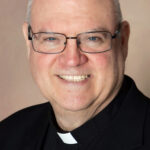By Corinne Winter
Last month, reflecting on belief in the Holy Spirit, I stated that the list of beliefs at the conclusion of the creed attests to the work of the Holy Spirit among us. In this final reflection of the series, I want to look at that list more closely as a testament that the work of the Spirit is to draw us into the life of God, the life we were created to share.
 The first belief mentioned in the creeds after the Holy Spirit is belief in the church. As both reading and experience tell us, believing in the church is a stumbling block for many. Even many who continue to feel connected to the church have a few questions about the description “holy, Catholic church,” in the Apostles’ Creed and “one, holy, catholic and apostolic Church” in the Nicene Creed. How do we call the church holy when all of us, its members, know ourselves as sinners? When even some leaders of the church are convicted of sinful acts? How do we call the church catholic, which means universal, when many people say they feel unwelcome because of their race, sexual preference, marital status, age or political convictions?
The first belief mentioned in the creeds after the Holy Spirit is belief in the church. As both reading and experience tell us, believing in the church is a stumbling block for many. Even many who continue to feel connected to the church have a few questions about the description “holy, Catholic church,” in the Apostles’ Creed and “one, holy, catholic and apostolic Church” in the Nicene Creed. How do we call the church holy when all of us, its members, know ourselves as sinners? When even some leaders of the church are convicted of sinful acts? How do we call the church catholic, which means universal, when many people say they feel unwelcome because of their race, sexual preference, marital status, age or political convictions?
It is vital that we acknowledge the personal and institutional failings within the church. We must attribute the characteristics or marks of the church not to human achievement but to the calling of the church and to the One who calls. It seems to me that as we read Scripture, we meet God calling and working through people who are also sinners. Individually and communally, those people fail repeatedly, often catastrophically. God does not abandon them. Rather, God calls for repentance and reform, often through the work of prophets.
The universality of the church, like its holiness, lies in its calling. One of my favorite descriptions is found in “Lumen Gentium:” “The church is … a sign and instrument…of communion with God and of unity among all people (LG 1, also CCC 775.)” To believe in the church is to believe in God’s power to transform. It includes believing that God calls and by the power of the Holy Spirit draws all creation into communion with and in God. We must become willing instruments of the Spirit’s call, sometimes being patient with the slow process of transformation, sometimes speaking up about the need for change.
We believe in the communion of saints. It can be easy to miss the full meaning of this teaching if we believe it refers only to the ability of saints in heaven to inspire and intercede for us. In fact, the communion of saints includes all baptized persons, living and deceased, and is meant to include all persons. United in Christ, we share in his goodness and in that of every member of Christ’s body (see CCC 646-62). This belief supports our devotion to canonized saints as well as our prayer for those who have died. It also challenges us to appreciate the gifts of others, to call them forth, and to understand our own gifts as belonging to the community. Belonging to the church is not about seeking our individual salvation; it is about working for the salvation of all.
We believe in the forgiveness of sin. The Gospels are filled with Jesus’ admonitions to trust in God’s mercy and to forgive one another. I once had a student walk out of class after asking whether the known perpetrator of a heinous crime could and should be forgiven. At the time, the student couldn’t make the distinction between forgiving the sin and condoning the behavior. To believe in the power of the Holy Spirit is to understand that every person is beloved of God and invited to conversion and to sharing in God’s life.
We believe in the resurrection of the body. Many students assume that this phrase refers only to Jesus’ resurrection. That doctrine was covered earlier in the creed. In this context, we express our belief that our bodies too are destined for resurrection. We can’t know exactly what that looks like. We understand that everything that makes us who we are is destined to be part of the “life everlasting” that concludes our prayer.
The concept of eternity boggles our imaginations. What can it be? There was a time when preachers and teachers tended to use images suggesting a superabundance of time. But eternity is beyond time, free of the constraints of time such as before and after. I remember being afraid that eternal life might be boring, especially when someone suggested to us 10-year-olds that it would be like everlasting church. We need to resist our desire for a definition. We are called to trust that eternal life is the fulfillment of the promise of our inexhaustibly generous and loving God.
It is the full share in the divine life that we glimpse in limited ways when we wonder at creation, reflect on Scripture, pray, participate in the sacraments and worship of the church, serve, love and forgive one another.
(Corinne Winter is a professor-emerita of St. Ambrose University, Davenport.)











